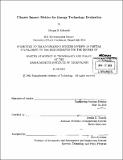Climate impact metrics for energy technology evaluation
Author(s)
Edwards, Morgan Rae
DownloadFull printable version (12.65Mb)
Other Contributors
Massachusetts Institute of Technology. Engineering Systems Division.
Advisor
Jessika E. Trancik.
Terms of use
Metadata
Show full item recordAbstract
The climate change mitigation potential of energy technologies depends on how their lifecycle greenhouse gas emissions compare to global climate stabilization goals. Current methods for comparing technologies, which assess impacts over an arbitrary, fixed time horizon, do not acknowledge the critical link between technology choices and climate dynamics. In this thesis, I ask how we can use information about the temporal characteristics of greenhouse gases to design new metrics for comparing energy technologies. I propose two new metrics: the Cumulative Climate Impact (CCI) and Instantaneous Climate Impact (ICI). These metrics use limited information about the climate system, such as the year when stabilization occurs, to calculate tradeoffs between greenhouse gases, and hence the technologies that emit these gases. The CCI and ICI represent a middle ground between current metrics and commonly-proposed alternatives, in terms of their level of complexity and information requirements. I apply the CCI and ICI to evaluate the climate change mitigation potential of energy technologies in the transportation sector, with a focus on alternative fuels. I highlight key policy debates about the role of (a) natural gas as a "bridge" to a low carbon energy future and (b) third generation biofuels as a long-term energy solution. New metrics shed light on critical timing-related questions that current metrics gloss over. If natural gas is a bridge fuel, how long is this bridge? If algae biofuels are not commercially viable for the next twenty years, can they still provide a significant climate benefit? I simulate technology decisions using new metrics, and existing metrics like the Global Warming Potential (GWP), identifying the conditions where new metrics improve on existing methods as well as the conditions under which new metrics fail. I show that metrics of intermediate complexity, such as the CCI and ICI, provide a simple, reliable, and policy-relevant approach to technology evaluation and capture key features of the future climate system. I extend these insights to energy technologies in the electricity sector as well as a variety of environmental impact categories.
Description
Thesis (S.M. in Technology and Policy)--Massachusetts Institute of Technology, Engineering Systems Division, 2013. Cataloged from PDF version of thesis. Includes bibliographical references (p. 87-97).
Date issued
2013Department
Massachusetts Institute of Technology. Engineering Systems DivisionPublisher
Massachusetts Institute of Technology
Keywords
Engineering Systems Division.